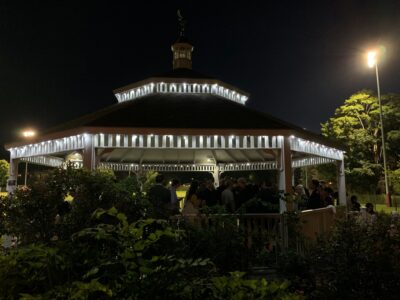If the speeches at a Lights for Liberty vigil on July 12 in New Castle–one of some 750 such vigils nationwide–shared any one theme, it would be encouraging empathy; and moreover, it would be the “radical empathy” that Secretary Hillary Clinton described as necessary to continue to fight.
By Grace Bennett
“The fact that you feel trauma means you’re still feeling, you’re still showing compassion and boy do we need that right now,” Hillary Clinton said during her surprise visit together with Bill Clinton at the Town gazebo where she joined other speakers invited by the event’s local sponsor, Left of Main Street, a Chappaqua-based, national organization which supports progressive issues, legislation and candidates.
“We need radical empathy right now,” said Clinton. “We need to put ourselves into other’s shoes and try to relate to that mother who encountered violence…”
First to speak, New Castle Councilwoman Ivy Pool extolled the Chappaqua community as a tolerant and welcoming community to all. She also pointed out “the tremendous gap between the good fortune, beauty, and comfort of our lives here in Chappaqua and the inhumane and unjust conditions that children of migrant populations face.
“Moral Compass”
“My kids are and continue to be in all decisions that I make–my moral compass… But for an accident of birth that children here were born in Northern Westchester Hospital and not in Central America… I’d like to believe that I would do anything to protect the safety and health of my child, and have the courage to leave behind my family and friends to endure dangerous travel conditions and seek asylum for my family if we were faced with the life-threatening violence and persecution.
“Most of us have never been so threatened,” said Pool. “We are challenged to respond with empathy, love and generosity.”
Professor Vanessa Merton, director of the Immigration Justice Center at the Pace University School of Law, said that she “won’t dwell on the lice, the feces, the cruelty and sexual assaults and deprivation of food or decent medical care.” She did drive home the anxiety any parent feels being separated even for the shortest period.
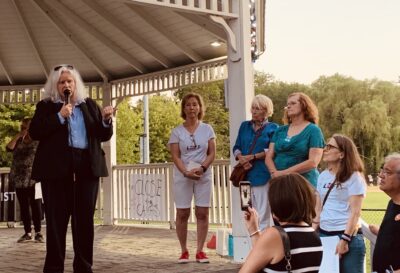
“Do you remember being at the shopping mall or beach, and if you became separated for even five minutes… the abject fear you felt? These parents or guardians are experiencing that all day, every day, and with constant knowledge that their children are in fact in danger. She described the experience the children are having as ‘stunting’ and ‘soul crippling.’
She also described working with families who risked their lives, “who have given up everything they have because they are fleeing a state sponsored terror in the Honduras and in Guatemala.
“These are not just war lords. These are transnational criminal syndicates that rule every aspect of people’s lives. Small business owners who tried to pay the taxes imposed wake up to find the body parts of their children scattered around.”
“Vicarious Trauma”
Dr. Jeanne Devine, a licensed clinical psychologist with a specialty in neuropsychology, said that stress hormones released during trauma results in lifelong impairment. “There’s a new generation of people that we have harmed. This isn’t just for today. This is about people we are going to have to help find a way to take care of later on.” She also expressed concern for the mental health among those who resist. We are all experiencing “vicarious trauma,” she posited—”every time you get teary, every time your heart crunches, every time you scroll past something because can’t read one more thing.”
A Policy “Infused with Cruelty”
Hillary Clinton said that Lights for Liberty represented a way to come together to address what’s happening at the border, “to do whatever we can to stand up for those who are voiceless.
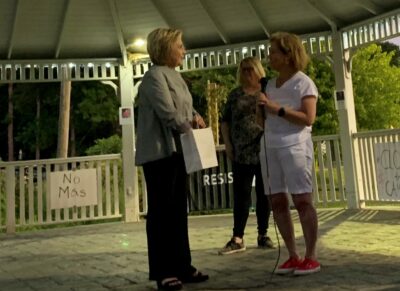
“This is not about open borders; it’s not about saying that anyone who can come to America at any time. Those who are trying to make it that are deliberately trying to confuse the issue. We can have secure borders and be a humane nation that treats people with dignity and compassion. That should be our goal.”
She further noted that if the administration had a “serious interest in dealing with the challenges of the border, that is what we would be doing.”
The border situation calls out for more properly trained immigration judges “enforcing the law and not shortcutting it,” said Clinton, who also suggested that we could have a functional data system. “There are literally thousands of children who have been separated and no one in this government knows where they are… I fear greatly they will never be reunited with their families...
“Think about never seeing your parents and family again because you were deliberately snatched away with no effort to try to track you in this system that has been set up… This is a policy that is infused with cruelty. It is a cruel, unfeeling, unfair, meanspirited policy that is not solving the problem because the problem is deeply imbedded in poorly governed, violent countries on average the most violent in the world, with the highest homicide rate–higher than in some conflict zones.”
The response of the Trump administration, she said, has been to cut off all aid to those countries. A better approach, Clinton suggested, would be for the U.S. to help these countries with rule of law, “and frankly to help them with their economic problems too (”a failed coffee crop, a failed banana crop”) so people wouldn’t feel compelled to leave. We do have the capacity to respond to the most complicated problems–if we choose to do so.”
She recalled that during her time as Secretary of State, there were efforts to establish facilities and hire personnel within the capitals of those countries to try to process asylum “so people wouldn’t have to take the dangerous route north and bring their children with them. She said during one trip to Central America “there were discussions over the kind of assistance we could provide that would try to end the corruption and malfeasance of the existing governments and put into place some programs that would begin to diminish the violence.”
“We have helped to do that in other places over the last 30 years; we could be doing that right here.” Particularly disturbing targets for deportation have been people serving in the U.S. military, Clinton noted. “They signed up under a program that they would serve in the military and then be put on a fast track to citizenship. “They have already been deported after combat tours in Iraq and Afghanistan. Now their spouses and children being targeted. There’s no justification for this policy.”
Clinton encouraged those gathered to keep fighting and “reclaiming the values of our country that are under so much stress and attack right now.” Striking a lighter note, she mentioned the stress causing construction on Route 120, the redevelopment project known here as Streetscapes. She joked that she chose Chappaqua’s vigil over others because it was the closest. She advised that residents take their resilience to that into the political environment.
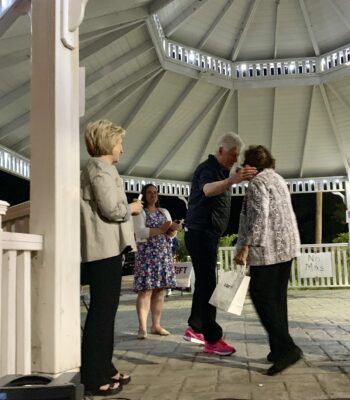
Helen Harrison, a Chappaqua ESL Teacher, described how some of her students at Greeley have expressed their fears to her. Since 2016, she said she “has spent many days helping different students cope–helping them understand the rules of what their rights are should ICE come knocking…. There are many kinds of people living here (in New Castle), and they are all part of the community; together we will overcome.” Harrison also led everyone gathered holding candles in singing We Shall Overcome.
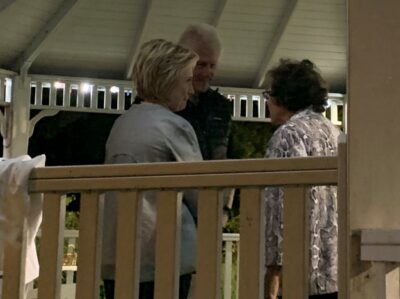
Congresswoman Nita Lowey arrived as a final speaker: “You don’t take babies and little ones through such hardship unless you are desperate,” said Lowey who noted that she was planning a trip to the Homestead Immigration Detention Center in Miami where she aimed to be given a full tour “and not just one room.” “Have you heard of Homestead?” she asked. “That’s where John Kelly runs quite an operation.” Lowey lamented the situations of the men and women “undergoing so much stress to find a better life for their families and children.” She then ‘spoke’ to Trump: “I do remember, Mr. President, when we had all kinds of glorious plans to help those countries in the northern triangle because there is corruption, there is crime and there are people who can’t take care of their families.
“When you think of what they go through to come to America and just be part of the American dream… for me as member of Congress, it’s not only painful, but an embarrassment, because we worked so hard to fund a whole range of assistance programs.”
Grace Bennett is founder, publisher and editor of the Inside Press, Inc., since 2003.
